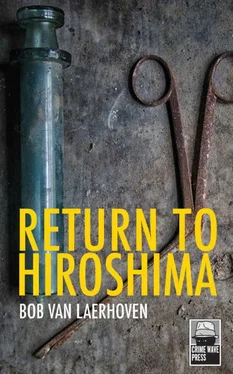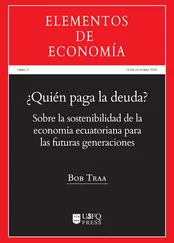Where did he get this obsession? When we meet people with this level of insanity we’re inclined to back off. We find it hard to believe, blame it on something else: voices, possession, schizophrenia, evil spirits, but never the person in front of us. He’s just a toy in the hands of a power we name at random and never fully understand, although we recognise echoes of it in our own mind.
When he was standing at the door Reizo said with apparent indifference: “Start with your earliest memories on Hashima. Can you still remember?” His face was as contradictory as my life: a swollen and bloody nose, at once brutal and childlike.
“A piece of open ground between the ruins,” I said. “I emerged from the rubble and saw what looked like a black carpet, but it was moving. I didn’t understand at first, then I realised it was a bunch of crows. They flew off as I approached. Their cawing and fluttering wings filled my world. They skimmed past me. I saw their eyes, sparkling with a strange and sinister light. I’ve never been so afraid in all my life.”
I lied: I’m more afraid now.
“Crows,” Reizo roared. “There are so many crows in my book! I want to hear them, now!”
With that he slammed the iron door and left me alone and lonelier than I have ever been.
Hiroshima – Suicide Club squat – Kabe-cho – Takeda – evening, March 14 th1995
“Where are you?” says Dr Adachi on the police frequency.
“In front of the warehouse Yori told me about. It looks abandoned.” Takeda is sitting in his Subaru Legacy staring at the neglected facade of the building and the remains of a couple of grimy neon signs. A street lamp casts an inhospitable grey light over the ripped tarmac of the car park.
“Your intuition was right,” the doctor continues. “The corpse has a chrysanthemum tattoo on its right heel.” He coughs. “It’s faded and small, but it’s clear enough.”
“It wasn’t intuition,” says the inspector. “The idea came from the photographer.” Adachi doesn’t react to Takeda’s observation. “So, where are the ladies?” the inspector continues.
“They’re watching TV. CNN. A documentary about the earthquake in Kobe on January 17th. Time flies, doesn’t it. So easy to forget.” Takeda can tell from his voice that the police doctor has been drinking. He makes nothing of it.
“Your mind is like a clock, Daichi.”
“And yours is a pink cloud, Akio.”
They laugh in unison.
“So what’s next?” says Adachi.
“Complete the puzzle.”
“How?”
“By carefully fitting together the pieces I already have.”
“If you ask me you don’t have enough pieces.”
“I can set my pink cloud to work.”
“You sound tired.”
“You’re right. It’s been a long, hard day. And it’s already after ten.”
“Whatever you do, be careful.”
“Is it impolite to go visiting after ten? You were raised the old fashioned way, weren’t you? You should…”
“Very funny. It’s extremely impolite and you know it. But I’m guessing it’s not really an issue.”
The two men sign off. Takeda takes a final look at the building. Before Adachi called him on the radio he tried to open the front door. It was locked. He thinks of giving it another try, but then decides it would be better to leave now if he wants to make it to Saijo, a city suburb, before midnight. It would be exceptionally un-Japanese to break the rules of politeness and go knocking any later.
As he drives away, a vague glow appears behind one of the windows.
Hiroshima – Saijo – Takeda – evening, March 14 th1995
Reizo Shiga’s parents live in Saijo, a fancy district on the outskirts of Hiroshima, residences surrounded by paddy fields. Takeda parks in front of the house. It looks like an oversized Swiss chalet: a wooden frame with white plaster walls. The inspector straightens his tie but doesn’t get out of the car. He had stopped on the way and called his wife from a telephone box.
“You don’t have to wait up.” That’s his usual way of letting her know she’ll be alone tonight. After this final visit Takeda has plans for the rest of the evening: a woman and a good night’s sleep.
“Okay. How was your day?” Under normal circumstances Takeda would have offered some meaningless reply to his wife’s meaningless politeness. But this time he said nothing, peered out over the swarming neon lights of the city. Why was everything so chaotically clear these days? He pictured his wife next to the phone, her right hand on her lap, the left holding the receiver to her ear.
“Problems with the boss,” he said.
A lengthy silence followed.
“Big problems?”
“He doesn’t agree with the way I reason things.”
He heard her breathe.
“There’s nothing wrong with the way you reason things, Akio.”
Takeda was touched that she had sided with him without even knowing what the conflict was about. Their long marriage, the nonchalance with which he had absorbed her existence into his, the loneliness she had endured for so many years, seem to fall on his back like an avalanche. He sensed his shoulders tense.
“I’m not Japanese enough,” he said. “I…” He didn’t complete the sentence. It surprised him that he had almost said: I’m not good enough , and how easy it would have been.
Instead he said: “I’ve tried to be a good husband, Ayako.”
“I know.” That was all she said.
“We should have had children.”
More than ten years earlier he had forced her to have an abortion. Since then he had used a condom on those rare occasions they made love. The idea of becoming a father had filled him with horror and panic. He had tried to explain, but all he could manage to tell her was a vague story about being in a Japcamp as a toddler and seeing so many children die. It had left him a little thin-skinned about the idea of starting a family. It was a lie: he was only seven months old when he and his mother were liberated.
When she was drunk, his mother would follow him through the house, screaming about what had happened to her and what she had done to his older half-brother. She threatened to do the same to him. Later she would whine and dribble, begging his forgiveness as if he was his nameless brother’s reincarnation.
Takeda’s wife had accepted his decision as always, although he noticed occasional sidelong looks of reproach. When he looked her straight in the eye she would resign herself.
“How do you feel?” said Takeda. “I’ve never really asked you how you feel.” He sensed panic because he had let his mask slip. “At work they used to praise my intuition. It was as if I could get under a criminal’s skin. None of it was true, but I enjoyed the reputation and never contradicted it. It was just guesswork, sheer luck, with the odd hint of insight. What I actually sensed were echoes of the terror, powerlessness and fear of the victims, because I had experienced the same as a child.”
He fell silent. He should have explained it differently. He was sorry he called her.
“I hope the problems get solved, sooner rather than later,’ said his wife.
They hung up simultaneously.
As he took the exit for Saijo, Takeda realised that his renowned intuition had always ignored the echoes of terror, powerlessness and fear coming from his wife.
Notes from Mitsuko’s basement prison
Where do I begin? Like some grim fairytale… once upon a time there was a lonely girl living in a world of rot and decay . There were crows everywhere, in huge flocks, never alone. The sea was a giant and sinister crater. The girl saw her father as a mat-finished ball, always on the move, rolling all over, crushing everything in its slippery path. The world slowly took shape, as it does for young children. But for the lonely young girl it remained a Shangri-La much longer than normal, a place where everything was possible, a place where dreams had no boundaries. The girl stopped growing when she was seven feet tall, but inside she stayed small. The girl has been alone for as long as she can remember. The ghost of her mother haunted the place. She was a shadow, a pale face, a vague pain in her heart. Her father’s face seemed carved from stone when he came to tell the girl that her mother was dead.
Читать дальше












